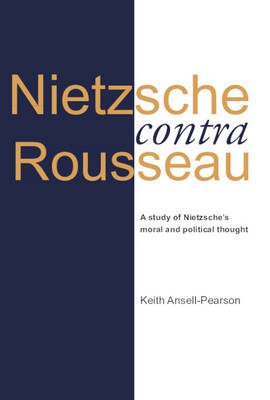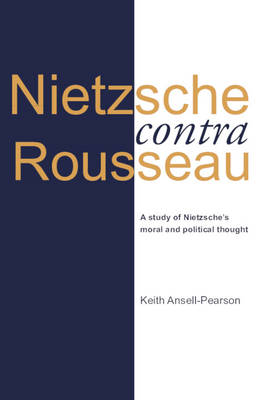
Bedankt voor het vertrouwen het afgelopen jaar! Om jou te bedanken bieden we GRATIS verzending (in België) aan op alles gedurende de hele maand januari.
- Afhalen na 1 uur in een winkel met voorraad
- In januari gratis thuislevering in België
- Ruim aanbod met 7 miljoen producten
Bedankt voor het vertrouwen het afgelopen jaar! Om jou te bedanken bieden we GRATIS verzending (in België) aan op alles gedurende de hele maand januari.
- Afhalen na 1 uur in een winkel met voorraad
- In januari gratis thuislevering in België
- Ruim aanbod met 7 miljoen producten
Zoeken
Nietzsche Contra Rousseau
A Study of Nietzsche's Moral and Political Thought
Keith Ansell-Pearson
Paperback | Engels
€ 76,45
+ 152 punten
Omschrijving
Keith Ansell-Pearson's book is an important and very welcome contribution to a neglected area of research: Nietzsche's political thought. Nietzsche is widely regarded as a significant moral philosopher, but his political thinking has often been dismissed as either impossibly individualistic or dangerously totalitarian. Nietzsche contra Rousseau takes a serious look at Nietzsche as political thinker and relates his political ideas to the dominant traditions of modern political thought. In particular, the nature of Nietzsche's dialogue with the philosophy of Jean-Jacques Rousseau is examined, in order to demonstrate Rousseau's crucial role in Nietzsche's understanding of modernity and its discontents.
Specificaties
Betrokkenen
- Auteur(s):
- Uitgeverij:
Inhoud
- Aantal bladzijden:
- 304
- Taal:
- Engels
Eigenschappen
- Productcode (EAN):
- 9780521575690
- Verschijningsdatum:
- 8/08/1996
- Uitvoering:
- Paperback
- Formaat:
- Trade paperback (VS)
- Afmetingen:
- 170 mm x 214 mm
- Gewicht:
- 458 g

Alleen bij Standaard Boekhandel
+ 152 punten op je klantenkaart van Standaard Boekhandel
Beoordelingen
We publiceren alleen reviews die voldoen aan de voorwaarden voor reviews. Bekijk onze voorwaarden voor reviews.









